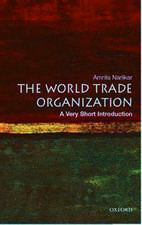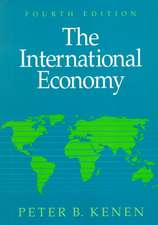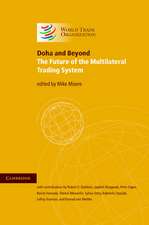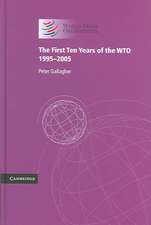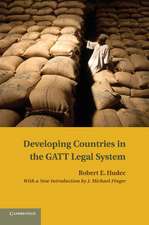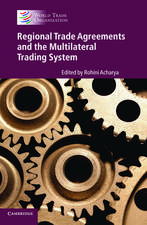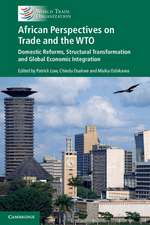Managing the Challenges of WTO Participation: 45 Case Studies
Editat de Peter Gallagher, Patrick Low, Andrew L. Stoleren Limba Engleză Hardback – 14 dec 2005
| Toate formatele și edițiile | Preț | Express |
|---|---|---|
| Paperback (1) | 629.83 lei 6-8 săpt. | |
| Cambridge University Press – 14 dec 2005 | 629.83 lei 6-8 săpt. | |
| Hardback (1) | 1206.42 lei 6-8 săpt. | |
| Cambridge University Press – 14 dec 2005 | 1206.42 lei 6-8 săpt. |
Preț: 1206.42 lei
Preț vechi: 1402.81 lei
-14% Nou
Puncte Express: 1810
Preț estimativ în valută:
230.86€ • 246.86$ • 192.48£
230.86€ • 246.86$ • 192.48£
Carte tipărită la comandă
Livrare economică 18 aprilie-02 mai
Preluare comenzi: 021 569.72.76
Specificații
ISBN-13: 9780521860147
ISBN-10: 0521860148
Pagini: 668
Ilustrații: 22 tables
Dimensiuni: 152 x 229 x 37 mm
Greutate: 1.16 kg
Editura: Cambridge University Press
Colecția Cambridge University Press
Locul publicării:Cambridge, United Kingdom
ISBN-10: 0521860148
Pagini: 668
Ilustrații: 22 tables
Dimensiuni: 152 x 229 x 37 mm
Greutate: 1.16 kg
Editura: Cambridge University Press
Colecția Cambridge University Press
Locul publicării:Cambridge, United Kingdom
Cuprins
Figures; Tables; Acknowledgements; Introduction; 1. Dispute settlement between developing countries: Argentina and Chilean price bands; 2. Argentina and GATS: a study on the domestic determinants of GATS commitments; 3. Rock'n'roll in Bangladesh: protecting intellectual property rights in music; 4. Barbados: telecommunications liberalisation; 5. Services commitments: case studies from Belize and Costa Rica; 6. Inter-agency policy coordination in Botswana; 7. Brazil and the G-20 group of developing countries; 8. Cambodia's accession to WTO: 'fast tracked' accession by a least developed economy; 9. Canada and the WTO: multilevel governance, public policy-making and the WTO auto pact case; 10. SPS and crisis management: the Chile-EU avian influenza experience; 11. Shanghai's World Trade Organization (WTO) Affairs Consultation Center: working together to take advantage of WTO membership; 12. Costa Rica's challenge to US restrictions on the import of underwear; 13. Fiji: preparing for the end of preferences?; 14. The road to Cancún: the French decision-making process on WTO negotiations; 15. Decision-making processes in India: the case of the agriculture negotiations; 16. Protecting the geographical indication for Darjeeling tea; 17. The Indian shrimp industry organizes to fight the threat of anti-dumping action; 18. Indonesia's shrimp exports: meeting the challenge of quality standards; 19. Patents, parallel importation and compulsory licensing of HIV/AIDS drugs: experience from Kenya; 20. Kenya's participation in the WTO: lessons learned; 21. Learning by doing: the impact of a trade remedy case in Korea; 22. Laos: the textile and garment industry in the post-ATC era; 23. Malawi in the multilateral trading system; 24. Malaysia: labelling regulations on natural rubber condoms and the WTO TBT agreement; 25. Malaysia: strategies for the liberalisation of the services sector; 26. Mauritius: cooperation in an economy evolving for the future; 27. How regional economic communities can facilitate participation in the WTO: the experience of Mauritius and Zambia; 28. Mexico's agricultural trade policies: international commitments and domestic pressure; 29. Mongolia's WTO accession: expectations and realities of WTO membership; 30. Nepal: the role of an NGO in support of accession; 31. Nepal: exports of ayurvedic herbal remedies and SPS issues; 32. Import prohibition as a trade policy instrument: the Nigerian experience; 33. The Pacific Island nations: towards shared representation; 34. Victory in principle: Pakistan's dispute settlement case on combed cotton yarn exports to the United States; 35. Pakistan: the consequences of a change in the EC rice regime; 36. Philippines: stakeholder participation in agricultural policy formation; 37. Philippines: adopting the transaction basis for customs valuation; 38. The reform of South Africa's anti-dumping regime; 39. What impact did the GATS have on telecoms competition in Sri Lanka?; 40. Thailand: conciliating a dispute on tuna exports to the EC; 41. Uganda's participation in the WTO negotiations: institutional challenges; 42. Uruguay in the services negotiations: strategy and challenges; 43. Vanuatu's suspended accession bid: second thoughts?; 44. Public and private participation in agricultural negotiations: the experience of Venezuela; 45. Vietnam's preparation for WTO accession in the banking sector.
Recenzii
'One of the most important aspects of the functioning of such a complex system as the multilateral trade, is to understand how countries deal with difficult policy choices. the case studies presented in this book constitute a unique and very useful contribution to this problem.' Renato Ruggiero, Vice Chairman, European Investment Bank and Former director General of the WTO
'This book is a refreshing antidote to many of the popular myths and misconceptions about the WTO. Its wealth of case studies shows how membership creates opportunities and rights, as well as obligations, and that what individual countries make of them is the key determinant of their success in harnessing the benefits of trade'. Guy de Jonguières, Asia columnist and commentator for The Financial Times
'As far as I know, these case studies are unique in WTO-related literature and give us a real insight into how different governments formulate their policies in respect of the WTO.' Peter Sutherland, Former WTO Director-General
'This book is the first of its kind and makes an invaluable contribution to understanding the workings of the WTO. These case studies show that what happens in Geneva is very often the result of a complex process that takes place in national capitals.' Clayton Yeutter, Former United States Trade Representative
'In this book you are very capably guided through the game that is international trade and shown the human face of the WTO. … In the right hands, good facts, sound research, and clever ideas can be powerful instruments of policy change and reform. This book has the potential to be just that. Alexander Downer, Australian Minister for Foreign Affairs
'Most of the studies are by researchers from the countries concerned, some of them, particularly in the Latin American cases, excellent … Four chapters are on the process of negotiating services in the Uruguay Round or telecoms more recently. These not only demonstrate the importance of national agendas in determining countries' commitments in an area where there were few demands, but are also illuminating on how coalitions and negotiating positions are formed in a new area …' Development Policy Review
'The book is recommended reading for the business and lobbyist community, affected by WTO decisions as well as for government and non-governmental organisation officials, involved in effective international trade policy design, conduct of negotiations or implementation. Interviews with the actual economic and political actors form an essential part of the case studies. … The book helps to rule out some of the misconceptions against the WTO as an institution, which, judging from the experiences in the book, turns out to be much less influential than most observers tend to believe.' De Economist
'The book should be compulsory reading for economists, policy makers and technocrats in developing countries.' Development and Change
'This book is a refreshing antidote to many of the popular myths and misconceptions about the WTO. Its wealth of case studies shows how membership creates opportunities and rights, as well as obligations, and that what individual countries make of them is the key determinant of their success in harnessing the benefits of trade'. Guy de Jonguières, Asia columnist and commentator for The Financial Times
'As far as I know, these case studies are unique in WTO-related literature and give us a real insight into how different governments formulate their policies in respect of the WTO.' Peter Sutherland, Former WTO Director-General
'This book is the first of its kind and makes an invaluable contribution to understanding the workings of the WTO. These case studies show that what happens in Geneva is very often the result of a complex process that takes place in national capitals.' Clayton Yeutter, Former United States Trade Representative
'In this book you are very capably guided through the game that is international trade and shown the human face of the WTO. … In the right hands, good facts, sound research, and clever ideas can be powerful instruments of policy change and reform. This book has the potential to be just that. Alexander Downer, Australian Minister for Foreign Affairs
'Most of the studies are by researchers from the countries concerned, some of them, particularly in the Latin American cases, excellent … Four chapters are on the process of negotiating services in the Uruguay Round or telecoms more recently. These not only demonstrate the importance of national agendas in determining countries' commitments in an area where there were few demands, but are also illuminating on how coalitions and negotiating positions are formed in a new area …' Development Policy Review
'The book is recommended reading for the business and lobbyist community, affected by WTO decisions as well as for government and non-governmental organisation officials, involved in effective international trade policy design, conduct of negotiations or implementation. Interviews with the actual economic and political actors form an essential part of the case studies. … The book helps to rule out some of the misconceptions against the WTO as an institution, which, judging from the experiences in the book, turns out to be much less influential than most observers tend to believe.' De Economist
'The book should be compulsory reading for economists, policy makers and technocrats in developing countries.' Development and Change
Descriere
This 2005 book documents different experiences among economies in addressing the challenges of participating in the WTO.

